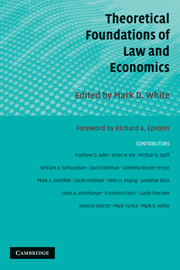Book contents
- Frontmatter
- Contents
- Foreword
- Preface
- Notes on Contributors
- PART ONE THE ROLE AND USE OF ECONOMICS IN LEGAL STUDIES
- 1 Modeling Courts
- 2 Is There a Method to the Madness? Why Creative and Counterintuitive Proposals Are Counterproductive
- 3 Functional Law and Economics
- 4 Legal Fictionalism and the Economics of Normativity
- PART TWO EFFICIENCY
- PART THREE RATIONALITY AND THE LAW
- PART FOUR VALUES AND ETHICS IN CIVIL AND CRIMINAL LAW
- Index
- References
1 - Modeling Courts
Published online by Cambridge University Press: 06 July 2009
- Frontmatter
- Contents
- Foreword
- Preface
- Notes on Contributors
- PART ONE THE ROLE AND USE OF ECONOMICS IN LEGAL STUDIES
- 1 Modeling Courts
- 2 Is There a Method to the Madness? Why Creative and Counterintuitive Proposals Are Counterproductive
- 3 Functional Law and Economics
- 4 Legal Fictionalism and the Economics of Normativity
- PART TWO EFFICIENCY
- PART THREE RATIONALITY AND THE LAW
- PART FOUR VALUES AND ETHICS IN CIVIL AND CRIMINAL LAW
- Index
- References
Summary
Models constitute a central element in the methodology of economic analysis of law. John Brown's model of accident law and others’ models of settlement and litigation, for instance, have provided numerous insights into tort law and to civil procedure respectively. Other models have been less successful. Despite their ubiquity, however, the role of models in economic analysis of law has been little discussed. How do models explain? How, or what, do we learn from them? What explains the differential success of models? What makes a model a good one? Under what circumstances ought policymakers rely on the results of a model?
These questions are notoriously difficult, in part because the concept of a model is itself unclear. I shall address the question of what makes a “good” model by discussing in detail two narrow classes of models of adjudication that have often been understood as competitive. These classes – which I shall call, in the context of courts, case space (but in the more general context of administrative agencies and legislatures fact space) and policy space models – seek to explain the behavior of individual judges.
Models grounded in policy space abstract from the specific cases that, in actual adjudication, trigger judicial intervention and are the occasion for whatever policy-making courts do. Policy space models treat policies as fundamental and cases as nonexistent. Models grounded in case space, by contrast, take cases as fundamental; policies are described in terms of case dispositions.
- Type
- Chapter
- Information
- Theoretical Foundations of Law and Economics , pp. 1 - 20Publisher: Cambridge University PressPrint publication year: 2008
References
- 2
- Cited by



